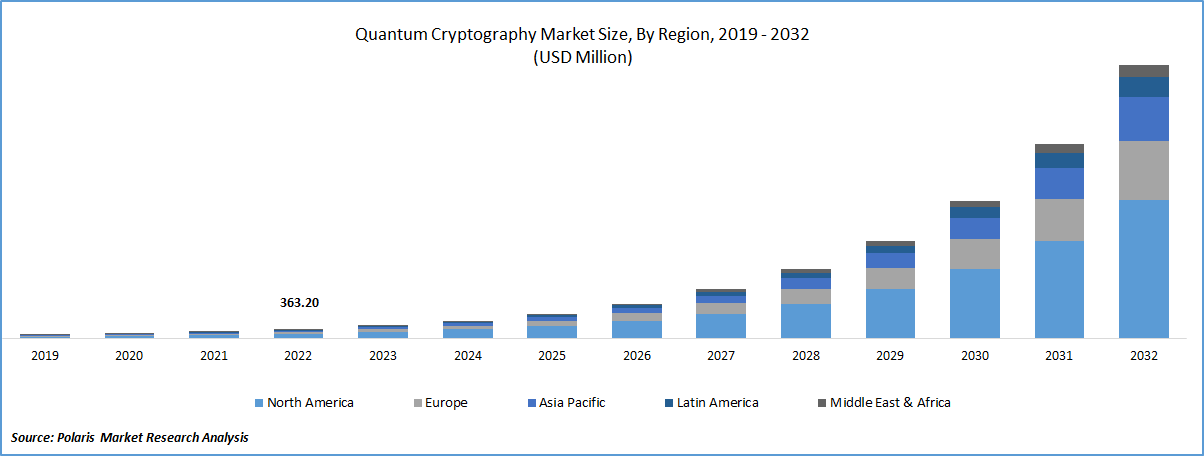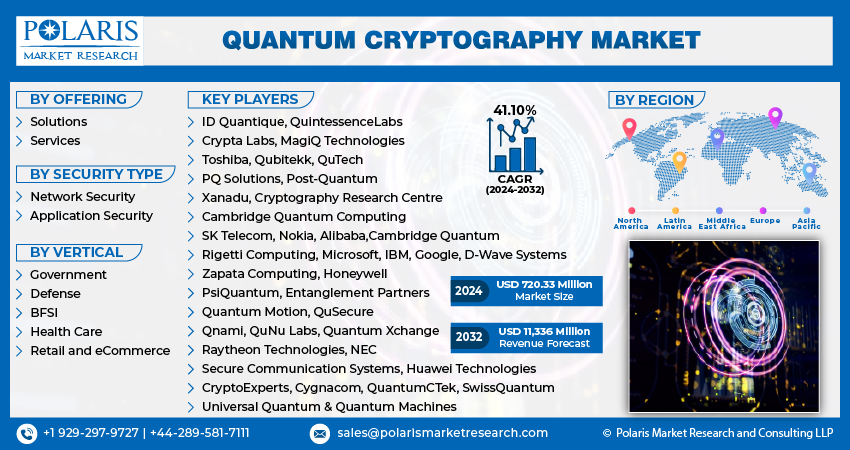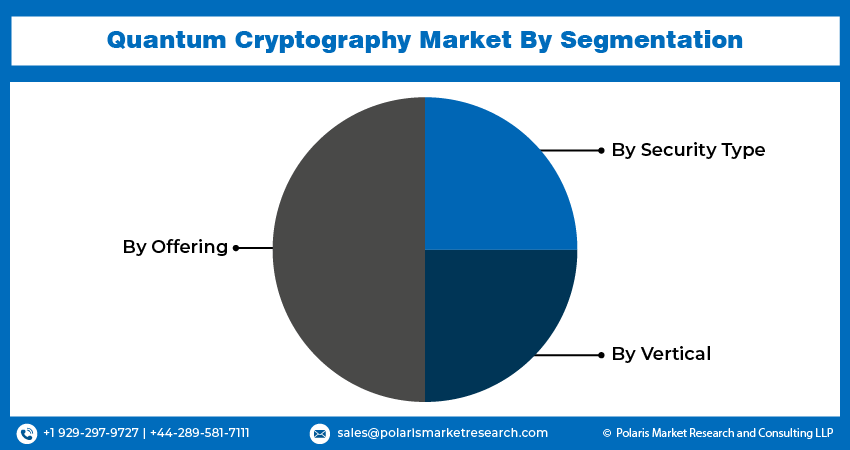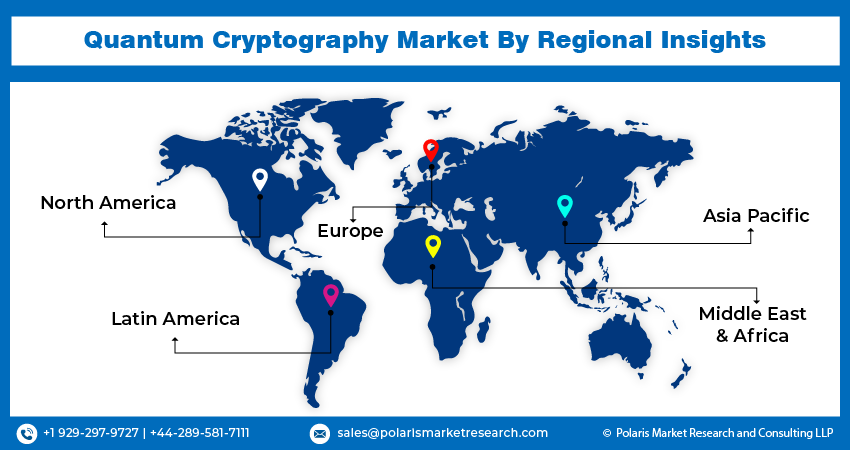
Quantum Cryptography Market Size, Share, Trends, & Industry Analysis Report
By Offering (Solutions and Services), By Security Type, By Vertical, and By Region – Market Forecast, 2025–2034
- Published Date:Jun-2025
- Pages: 114
- Format: PDF
- Report ID: PM3558
- Base Year: 2024
- Historical Data: 2020-2023
Market Overview
The quantum cryptography market size was valued at USD 715.99 million in 2024 and is projected exhibit a CAGR of 38.1% during 2025–2034. The growth is driven by increasing need for enhanced data security, advancements in quantum technology and infrastructure, and government initiatives and investments in cybersecurity.
Quantum cryptography, also known as quantum encryption, is a method that utilizes the principles of quantum mechanics to secure communication channels. Unlike traditional cryptography, which relies on mathematical algorithms, quantum cryptography uses the laws of physics to transmit information in a way that is theoretically impossible to intercept or decode. A key component of this technology is Quantum Key Distribution (QKD), which enables the secure exchange of cryptographic keys between two parties.

The market is driven by the increasing need for secure communication in sectors such as finance, government, and healthcare, where the protection of sensitive data is important. The rise in cyberattacks and the growing sophistication of cyber threats are further fueling the demand for advanced encryption methods like quantum cryptography.
The market is experiencing significant growth, driven by factors such as increasing investments in cybersecurity, advancements in quantum computing software, and the rising adoption of cloud-based contact center solutions. The technology addresses the vulnerabilities of existing security standards to quantum computing-based decryption, improving the security of communication networks. Quantum communication technologies play a critical role in the infrastructure needed to deploy high-impact, fault-tolerant quantum computers at scale. The demand is further expected to grow as organizations and governments worldwide recognize the importance of safeguarding their data and communications from potential quantum threats.
Industry Dynamics
Increasing Need for Enhanced Data Security
The number of cyber-attacks is rising worldwide, due to which the demand for quantum cryptography is rising. According to the National University, 5.4 billion cyber-attacks were recorded globally in 2022. Traditional cryptographic methods are vulnerable to advanced computational techniques, including the potential threat posed by future quantum computers. The need to protect sensitive information across various sectors, including government, finance, healthcare, and defense, is important, which in turn is driving the growth.
Advancements in Quantum Technology and Infrastructure
Advancements in quantum technology and the development of related infrastructure are improving the effectiveness of the technology. Progress in areas such as quantum computing, quantum communication networks, and the miniaturization of quantum devices are making quantum cryptographic solutions more practical and accessible. Additionally, significant advancements are occurring in the field of cryptographically relevant quantum computer. For instance, in April 2024, Quantinuum achieved 99.9% 2-qubit gate fidelity in a production environment in 2024, a crucial step towards building larger, more reliable quantum machines.
Government Initiatives and Investments in Cybersecurity
Government initiatives and investments in cybersecurity infrastructure worldwide are increasing. Governments are funding research and development projects and formulating strategies to adopt quantum-safe communication technologies as they are recognizing the long-term security implications of quantum computing. For instance, the U.S. government's National Institute of Standards and Technology (NIST) has been actively working on post-quantum cryptography standards to prepare for the era of quantum computers. Moreover, the Indian government's Union Budget for 2025 allocated over USD 228 million for cybersecurity initiatives, marking an 18% increase from the previous budget of 2024. Such government support and strategic initiatives are creating a favorable environment for the growth and adoption of quantum cryptography technologies, thereby driving the growth.

Segmental Insights
Offering Insight
The segmentation based on offering include solutions and services. The solutions segment accounts for the highest share in 2024 driven by rising demand for quantum key distribution (QKD) systems and other quantum-based hardware and software designed to secure communication infrastructure. The increasing need for robust security measures against evolving cyber threats, particularly those posed by future quantum computers, drives substantial investment in these tangible quantum cryptography solutions. Organizations across various sectors are prioritizing the deployment of these advanced systems to safeguard their sensitive data and maintain secure communication channels, thereby driving the segment growth.
The services segment is anticipated to exhibit the highest growth rate fueled by the increasing complexity of implementing and managing quantum cryptography solutions. Organizations require specialized expertise for tasks such as system integration, consulting, training, and ongoing maintenance. The demand for professional services to support technologies is rising as the adoption of quantum cryptography increases, thereby driving the segment growth.
Security Type Insight
The segmentation based on security type include network security and application security. The network security segment holds the largest share in 2024. This is because the initial focus of quantum cryptography has been on securing communication networks and infrastructure against secret and potential quantum threats. Quantum key distribution (QKD) technologies, primarily used for establishing secure keys over communication lines, fall under this segment and have seen significant early adoption by organizations prioritizing the security of their network communications. The fundamental need to protect the integrity and confidentiality of data transmitted across networks makes network security the dominant segment.
The application security subsegment is expected to witness the significant growth rate due to rising integration into specific applications beyond network communication which is gaining traction. This includes securing software applications, databases, and various digital platforms. The increasing need to protect sensitive data at the application level, coupled with the development of quantum-resistant algorithms suitable for diverse application environments, is driving the segment growth.
Market Evaluation By Vertical
The segmentation based on vertical include government, defence, BFSI, health care, and retail & ecommerce. The BFSI segment is anticipated to exhibit the significant growth fueled by the stringent regulatory requirements for data security, the high value of financial transactions and customer data, and the increasing threat of sophisticated cyberattacks targeting financial institutions. The potential impact of data breaches on financial stability and customer trust drives the adoption of advanced security measures. The BFSI sector is exploring and implementing quantum-safe cryptographic solutions to protect its critical assets and ensure long-term security as quantum computing threats grow, thereby driving the segment growth.

Regional Analysis
Quantum Cryptography Market in North America
North America quantum cryptography market held the largest share in 2024 driven by the presence of leading technology companies, substantial investments in research and development, and strong government initiatives focused on cybersecurity and quantum technologies. The early adoption of advanced security solutions by key sectors such as government, defense, and finance in the region further drives the growth. Additionally, the robust technological infrastructure and a proactive approach towards addressing security challenges further drives the growth of the industry in the region.
Quantum Cryptography Market in Asia Pacific
The Asia Pacific quantum cryptography market is projected to exhibit the highest growth rate over the forecast period driven by several factors, including increasing government investments in quantum research and development across countries such as China, Japan, and South Korea, the growing awareness of the importance of secure communication in rapidly digitalizing economies, and the rising number of cyber threats. The region's burgeoning technological advancements and a proactive stance towards adopting advanced security solutions drives the growth of the Asia Pacific quantum cryptography industry.

Key Players and Competitive Insights
The competitive landscape is characterized by a mix of established players and emerging startups, all striving to innovate and capture share. Competition is intensifying as the awareness of quantum threats grows and the demand for quantum-safe security solutions increases across various industry verticals. Key competitive strategies include technological innovation in QKD systems and post-quantum algorithms, strategic partnerships for penetration and technology integration, and a focus on developing cost-effective and scalable solutions. The market also sees collaborations between research institutions and companies to accelerate the development and commercialization of quantum cryptography technologies.
Some of the major players in the quantum cryptography market include ID Quantique, Quantum Xchange, Toshiba Corporation, MagiQ Technologies, Inc., QuintessenceLabs Pty Ltd, Crypta Labs Ltd, Qubitekk, Inc., Post-Quantum, PQShield, QNu Labs, KETS Quantum Security, and ISARA Corporation
List of Key Companies in Quantum Cryptography Indsutry:
- Crypta Labs Ltd
- ID Quantique
- ISARA Corporation
- KETS Quantum Security
- MagiQ Technologies, Inc.
- Post-Quantum
- PQShield
- QNu Labs
- Qubitekk, Inc.
- Quantum Xchange
- QuintessenceLabs Pty Ltd
- Toshiba Corporation
Quantum Cryptography Industry Developments
- In May 2025, Norma, a South Korean IT solutions provider, has partnered with Rigetti Computing to launch an 84-qubit quantum cloud service in South Korea. This collaboration aims to make advanced quantum computing resources more accessible to researchers and businesses in the region.
- In May 2025, China Telecom Quantum Group launched the world’s first hybrid quantum-safe encryption system, completing a 1,000-kilometer quantum-encrypted call between Beijing and Hefei, and rolled out the technology across 16 cities, advancing national quantum-secure communication infrastructure.
Quantum Cryptography Market Segmentation
By Offering Outlook (Revenue – USD Million, 2020–2034)
- Solutions
- Services
By Security Type Outlook (Revenue – USD Million, 2020–2034)
- Network Security
- Application Security
By Vertical Outlook (Revenue – USD Million, 2020–2034)
- Government
- Defense
- BFSI
- Health Care
- Retail & eCommerce
By Regional Outlook (Revenue-USD Million, 2020–2034)
- North America
- US
- Canada
- Mexic
- Europe
- Germany
- France
- UK
- Italy
- Spain
- Netherlands
- Russia
- Rest f Europe
- Asia-Pacific
- China
- Japan
- India
- Malaysia
- Suth Korea
- Indnesia
- Australia
- Vietnam
- Rest f Asia-Pacific
- Middle East & Africa
- Saudi Arabia
- UAE
- Israel
- Suth Africa
- Rest f Middle East & Africa
- Latin America
- Brazil
- Argentina
- Rest f Latin America
Quantum Cryptography Market Report Scope:
|
Report Attributes |
Details |
|
Market Size Value in 2024 |
USD 715.99 million |
|
Market Size Value in 2025 |
USD 986.99 million |
|
Revenue Forecast by 2034 |
USD 18,032.35 million |
|
CAGR |
38.1% from 2025 to 2034 |
|
Base Year |
2024 |
|
Historical Data |
2020–2023 |
|
Forecast Period |
2025–2034 |
|
Quantitative Units |
Revenue in USD million and CAGR from 2025 to 2034 |
|
Report Coverage |
Revenue Forecast, Market Competitive Landscape, Growth Factors, and Industry Insights |
|
Segments Covered |
|
|
Regional Scope |
|
|
Competitive Landscape |
|
|
Report Format |
|
|
Customization |
Report customization as per your requirements with respect to countries, regions, and segmentation. |
How is the report valuable for an organization?
Workflow/Innovation Strategy: The quantum cryptography market has been segmented into detailed segments of offering, security type, and vertical. Moreover, the study provides the reader with a detailed understanding of the different segments at both the global and regional levels.
Market Entry Strategies: A key growth strategy revolves around educating potential end-users about the long-term security advantages against quantum threats, emphasizing the limitations of classical cryptography in this evolving landscape. Strategic collaborations with telecommunication companies and network infrastructure providers are crucial for seamless integration and penetration. Focusing on developing industry-specific solutions that address the unique security needs of sectors like finance, government, and healthcare can drive targeted demand. Furthermore, investing in user-friendly and scalable quantum key distribution (QKD) systems and promoting the development of standardized protocols will be essential for wider adoption.
FAQ's
The global market size was valued at USD 715.99 million in 2024 and is projected to grow to USD 18,032.35 million by 2034.
The market is projected to register a CAGR of 38.1% during the forecast period, 2024-2034.
North America had the largest share of the market.
Some of the major players include ID Quantique, Quantum Xchange, Toshiba Corporation, MagiQ Technologies, Inc., QuintessenceLabs Pty Ltd, Crypta Labs Ltd, Qubitekk, Inc., Post-Quantum, PQShield, QNu Labs, KETS Quantum Security, and ISARA Corporation
The solutions segment accounted for the larger share of the market in 2024.
Following are some of the trends: ? Increasing Focus on Post-Quantum Cryptography (PQC): With the looming threat of quantum computers breaking current encryption, there is a significant push towards developing and adopting PQC algorithms and solutions. ? Growing Government Initiatives and Investments: Governments worldwide are recognizing the importance of quantum security and are investing in research, development, and standardization efforts for quantum cryptography technologies.
Quantum cryptography is a method of securing communication that uses the principles of quantum mechanics. Unlike traditional cryptography, which relies on mathematical algorithms that could potentially be broken by future computers, quantum cryptography leverages the fundamental laws of physics to ensure secure information transfer.
